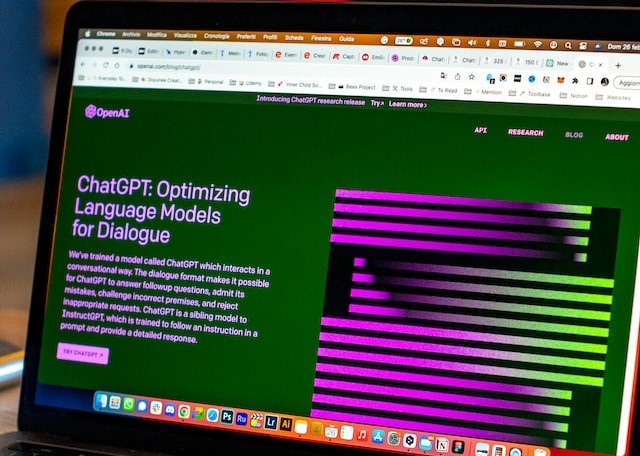For years and maybe even decades, technology experts and think-tanks have been warning us of the impact of automation and AI on work, skills and jobs. McKinsey, in its 2017 report on the Future of Work, which I had written about and shared on my blog in 2019, had indicated what kinds of jobs and in which sectors and industries are likely to be most impacted, in terms of automation and AI being able to replace humans. And they had advised on what businesses and governments ought to do to prepare for this wave of AI-driven automation, in order to train and reskill people better for this eventuality.
In fact, this wave of automation seems to have an air of inevitability about it. But, the kind of automation that we were anticipating and experiencing at the time was replacing dull, routine and repetitive tasks and was, therefore, not so different from automation and computerization of the past. With generative AI, something much more fundamental in automation has changed, and it could signal a break from previous kinds of automation.
McKinsey, in its new study, The State of AI in 2023, of how companies are adopting generative AI at work gives us a glimpse of what is to come. First, and most important, it suggests that generative AI is not just replacing routine and repetitive tasks, it is taking over important thinking, writing and knowledge-based tasks as well. And of the tasks that companies are automating, writing a first draft of a text document seems to be the most common, followed by certain marketing and product and service development tasks.

Of course, the survey is not a large one – with only 1684 respondents – and might not be representative of businesses across the world. Besides, I find certain aspects of the study quite strange. That said, if it is indeed true that writing a first draft of any text is being delegated – or should I say relegated – to a bot, it is cause for serious concern. For reasons that I mentioned in my first blog post on Open AI and ChatGPT, it means that business executives can now delegate the task of thinking itself to a machine, and in the process of doing so, make themselves redundant in no time.
Another aspect of AI that I don’t understand is, if this is the capability of ChatGPT4, what about the 1, 2 and 3 versions of it that went before? How did we suddenly arrive here, without being introduced properly to the former versions and why weren’t we warned of generative AI and ChatGPT earlier? Besides, why weren’t tech companies, governments and businesses telling us about all this and regulating it better right from the start?
I think we not only need to prepare and fortify ourselves better against this wave of generative AI, we need to anticipate its long-term impacts on work, skills and jobs. I have already written about generative AI’s impact on jobs like mine in the advertising and brand communications industry, which involve thinking, ideating, strategizing – also a form of ideating – and writing.
In this article, I would like to anticipate and explore the more long-lasting impacts of generative AI on work and argue that it can quietly and quickly deplete our professional worth, our working lives, job satisfaction, and also organisation cohesion and strength. After all, it didn’t take us long to get here – less than a decade, if we go by McKinsey’s 2017 report and now.
First is the ability of this generative AI to do our thinking and creating content work for us. Unlike earlier waves of automation and AI, which freed up humans to move up to higher order thinking and tasks, this time it could and will force us to move down to lower order levels of thinking and professional capabilities. Generative AI and bots will be our masters and we, their slaves. We will be relegated to mastering the art of the prompt, which might well become the most sought-after skill in future. I can already imagine thousands of courses, online and offline, on mastering the art of the prompt and how to get the most out of your AI tool! Jokes apart, there are such requirements of digital advertising even today. We are expected to think and write headlines, not based on the target audience, or the strategy, or idea, but on maximising SEO results on Google!
Then, imagine the generational impact of generative AI. Not only will our thinking, analysing and ideating skills disappear over time, with each generation of human existence, we will be giving up and losing more of our capability to think, comprehend, analyse, write and communicate. There will be no accretion of knowledge or skills over time, no osmosis in learning. Instead, we will be drained of all our capabilities and capacities that make us human and creatures of a higher order of empathy and intelligence.

There are many, including economists, who argue that AI is the biggest innovation of our times and the best thing to happen to productivity. It is touted to be a productivity game-changer and will improve our efficiency and effectiveness at work manifold. Generative AI and the new, improved versions of it to follow are estimated to add 7% to global GDP according to Goldman Sachs Research. Tech companies, especially those involved in AI and AI chips, such as Nvidia have seen their stocks soaring sky-high in recent months and weeks. It could be the next big asset bubble, even as economies slow down.
To this theory, I say that with fewer people at work, productivity ought to increase anyway. So perhaps our governments are all willing to sacrifice jobs and employment at the altar of AI and productivity gains. On the other hand, let us also remember the cautionary tale of “the productivity paradox” that economist, Robert Solow, revealed to us, and which I have written about before on my blog. He discovered that with all the automation and computerization in the US, productivity gains were nowhere to be found!
There is another camp on LinkedIn that argues that AI should not be seen merely as a productivity-enhancing tool, but as something that inspires us to achieve even higher levels of creativity. I am at pains to see how that is possible, when my ability to think and write is itself no longer required at the office. And if I am lucky to have my job, I will only be moving to lower-order skills and tasks. I think both camps’ arguments are misplaced. If AI and generative AI in particular are going to rob us humans of our most valued and important skills, as well as knowledge – things we acquire through years of formal education and learning on the job – there is something fundamentally wrong with the innovations themselves.
Of course, there are also those who argue in favour of the democratizing of skills by AI, which is to say that anyone, even a person without the formal learning and knowledge required, can master skills through AI now. I will deal with this issue separately later under the gig economy, but really, is that even an argument? That governments, civil society and businesses invest so much time and money in formal education and training, and none of it is required after all? These are some of the issues that AI and other tech companies, governments and regulators ought to be spending their time and energy thinking about.
We will all become prompt-masters, which is no different from giving orders and instructions, without the capability to do any thinking or creating ourselves. This brings me to the employment and organizational impact of generative AI. The world of work has already changed somewhat since the Covid-19 pandemic and it is thanks to technology that so many kinds of professional jobs are being done from home now. WFH was not just a trending hashtag, it is reality in many industries in several parts of the world. Companies are having a tough time getting their employees back to the office and at the most, company management and employees have been able to agree to what is being termed a hybrid work model or arrangement, where employees show up in office for three days a week and work from home the rest of the time.
I am myself not in favour of working from home, even though I have had to write my blog and think and write on brands from my parents’ home in Goa for over a decade now. Advocates of WFH argue for it on all kinds of grounds, including not requiring to commute and reducing environmental pollution. However, I think it is detrimental to an organisation’s sense of cohesiveness and its culture, because although certain types of work can be done from home, companies and organisations are about people meeting, discussing and working together in person, which no Zoom conference can replicate.
But, wait a minute. Could generative AI change all this even more than we can imagine?

It can, in more ways than one. On the one hand, generative AI or AI in general is supposed to empower us with so many skills, that we can work pretty much on our own. Champions of the gig economy already argue about the merits of working on one’s own and becoming what in the US is being called an independent service provider. And I have myself seen how much work and what kind of work I am capable of, when I use apps like Canva, MailChimp, Ezgif, Movavi, and so many others, that I would never attempt if I were working in an advertising agency office, like I used to in the old days.
But, let’s also get real. Just because I do so much designing work now for my blog and my ideas on brands using the Canva app, do I become a designer or art director? And do I become a filmmaker, just because I make videos for my blog using stock footage and the Movavi video editor at home? I know better than to call myself either a designer or filmmaker. So, I don’t buy into the democratizing nature of AI, but there is no denying that AI tools like these can make our work less dependent on others. It empowers the individual and reduces the need for co-workers. Which means AI will have a deleterious effect on teamwork and consequently on organisations.
Freelancing might become the order of the day. In fact, there are some who predict or anticipate the era of “the company of one” as I happened to read on LinkedIn. I daresay generative AI can hasten the entire process of change by eliminating jobs and entire levels in an organisation’s structure. Much of junior and middle management might become redundant in the new world of generative AI, because they are the people who do most of the thinking and the doing. Companies and organisations will become hollowed-out versions of themselves, with only order-givers and prompt masters. Ah, could we finally achieve the lean, flat organization structure that has eluded us all this while?!
I am not one for such wistful or wishful thinking. If companies have either replaced factory workers or have hired them as contract labour with no obligations towards them, what prevents them from doing the same with the managerial worker? Peter Drucker’s famous heralding of the manager as knowledge worker will be consigned to history, because AI is coming for those jobs now. The world of work as imagined by certain supreme knowledge workers and AI tech geeks is now the new world order, and they are the new masters of the universe.
It is obvious I feel a foreboding sense of gradual doom and damnation of mankind. But because I don’t wish to end this piece on such a gloomy note, I shall at least look forward to AI-based innovations in healthcare, medicine, engineering, finance, and so many other areas. In fact, the big deal about AI is the enabling role it is supposed to play in so many fields of human endeavour. Good and bad. And yet, our policymakers and regulators do not feel the need to think hard about these issues nor to regulate the various dimensions of AI, as well as its applications.
Meanwhile, not having tried ChatGPT or any of these generative AI tools yet, I shudder to think what ChatGPT version 5 might bring.
The featured image at the start of this post is by Emiliano Vittoriosi on Unsplash

Post script: The LinkedIn post that I have shared in my piece above on the theory that AI should not merely be a productivity tool, but a way to inspire us to higher levels of creativity, was sent to me as a notification and later deleted from my LinkedIn notifications page, which ought never to happen.
I suppose it was sent to me as a notification in the first place because it was from the Global CEO of Ogilvy, Devika Bulchandani, who recently took over this new role at Ogilvy in their New York office. I don’t know her, nor is she a LinkedIn connection, but I suspect her appointment and promotion itself has to do with PR agency mischief in India. As I have been writing on my blog and on LinkedIn, Perfect Relations’ unprofessional idiot bosses have been trying their damnedest to make me Devi Cherian, Dilip Cherian’s wife. And I am damned if I am going to allow them to make me her or anyone else! Besides, they are trying this trick by first making me either our maid in Goa, Sridevi, as I have written before, or my younger sister, Bhavani, neither of whom have anything to do with advertising and brand communications. In fact, I think Devi Cherian herself has nothing to do with advertising and brand communications.
I am not any Deva or Devi, but Geeta Sundaram. Please note, that if all this is as I suspect, all parties involved in these machinations don’t think it necessary to have a discussion with me first and foremost. And if they think they can push me into a corner and entrap me into working for them, which I know better than to do now, they are sadly mistaken. Such idiots are not meant to be in the corporate world and I can’t wait to have them and their cronies in RK Swamy/BBDO Chennai booted out of the industry, once and for all.
Obviously they have meddled at the highest levels in Ogilvy and WPP to swing this decision. To the extent that when I last wrote an email to Piyush Pandey who heads Ogilvy South Asia and is on the board of Ogilvy Worldwide, my email went unanswered, which is very surprising to say the least. And what was this email about? I had sent him a link to my blog post on advertising agencies’ intellectual property, sharing new additions to Ogilvy’s Magic Lanterns and recommending to him that Ogilvy ought to revive the old ones, as well as other brand-building tools as these are valuable intellectual assets of the agency. I left it to him to take this forward with the people concerned at Ogilvy.
The LinkedIn post on the “company of one” that I have also shared in my piece was pushed into my LinkedIn feed for me to read, as PR agency idiots do quite regularly both on LinkedIn and Twitter.


